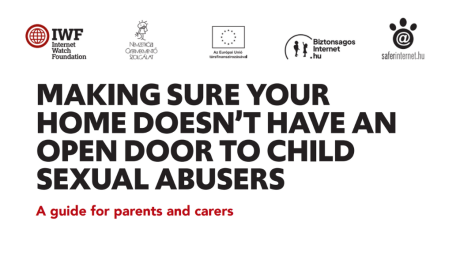As parents, many people think that their children are completely safe when they are in their own home. However, sexual predators can find children through online platforms and apps while their parents are in the next room.
What exactly do we mean by sexual abuse of children or young people?
Sexual abuse of children or young people is when a person under the age of 18 is coerced or tricked into sexual activity. It may be that children, due to their age, inexperience and innocence, do not understand that what is happening is abuse or exploitation, or that the situation is fundamentally wrong.
The online space can play a role in the sexual abuse of children or young people in several ways. The abuse itself may take place offline, but the images or videos made of the abuse may be shared by the perpetrator on the internet, or the act itself may take place entirely online. In the latter case, the attacker gets in touch with the victim through the internet, where the process of grooming and coercing the child’s involvement in creating sexual content takes place.
Let’s talk about grooming
The term grooming, that is building an emotional connection with a minor, has become widely known over recent years, especially because of its role in the online exploitation of children. In practice, grooming is manipulation, whereby online sexual predators try to gain the trust of children for the ultimate purpose of using the relationship for sexual abuse and/or exploitation.
No matter how shady and illegal the activity itself may be, it would be wrong to think that the online grooming and sexual exploitation of children takes place only in the darkest recesses of the internet. On the contrary...
What is the grooming process?
Grooming is the process by which a sexual predator intentionally builds an emotional connection with a child to gain their trust, gradually desensitising them to behaviour and situations that are otherwise most inappropriate. Predators make use of the information they find out about children, pretending to be friendly and interested, and once trust has been built up, they exploit the children’s vulnerabilities and secrets, using these to manipulate them.
In many cases, predators may try to isolate a child from their familiar surroundings, such as family and friends, and make themselves the first person the child turns to with any problem or when the child needs someone to talk to. Once a relationship of dependency has been established, abusers can introduce sexual content and behaviour, and talk children into crossing boundaries.
If a child wants to stop having contact with the predator of their own accord, the predator may use information and secrets extracted from the child, and often sexual content depicting them, to blackmail the victim and continue to abuse and exploit the child.
Children and young people, due to their inexperience and the naivety and gullibility arising from their age, frequently believe that grooming is perfectly alright as this is what the predator systematically leads them to believe.
Any child can become a victim...
Any child with unrestricted access to devices connected to the internet, and thus to social media platforms and apps, is exposed to the risk of online sexual abuse. However, it is also important to understand that entirely isolating children from the internet is not the solution...
Just as for adults, there are many benefits to being online for children. They have access to a wealth of useful, educational content and apps, but they can also keep in touch with their friends online, play games with them, find out things that interest and affect them, and create their own private lives. All of these are very important from the aspect of their development and becoming an adult.
Banning or stopping children from using social media will not eliminate the risk. Children may consider such extreme restrictions to be punishment, which often makes them feel angry and resentful, and they will look for loopholes to get round the punishment. Children in such cases often turn away from their parents, and in the future there will be even less chance for them to communicate openly about the experiences they have had online, including online sexual exploitation and abuse among other things.
What can we as parents do to prevent our children from being groomed?
The Internet Watch Foundation (IWF) has identified four essential points to follow in order to take action and prevent the online sexual exploitation and abuse of children.
Talk to your children about online sexual abuse. Be proactive, but at the same time listen to your children’s concerns and experiences, as a lot can be learnt from them too.
Make an agreement with them about the basic rules for using technology and make the whole family abide by them. Invest time in finding out about the platforms and apps that your children use and like.
Ask about their online lives and activities, while encouraging them to use content that is appropriate for them.
Learn how to use the tools, apps and settings that can help keep your children safe online and use them. Explain to your children that the rules are not against them, but for them.
IWF guide for parents and guardians on preventing the sexual exploitation of children and young people
Unfortunately, child sexual abuse does not discriminate: it can happen anywhere and to anyone. Fortunately, however, as parents our hands are not tied. We can do something about the problem and we can prevent it.
The IWF’s guide can help you learn more about sexual abuse committed against children online. The guide also explains how children use social media and why banning them from it is not a good solution. The guide answers the questions parents are most likely to raise. It also explains what to do if you suspect that a child is being sexually abused online, and describes specialist organisations that can also help when trouble arises.
The guide is available here.
